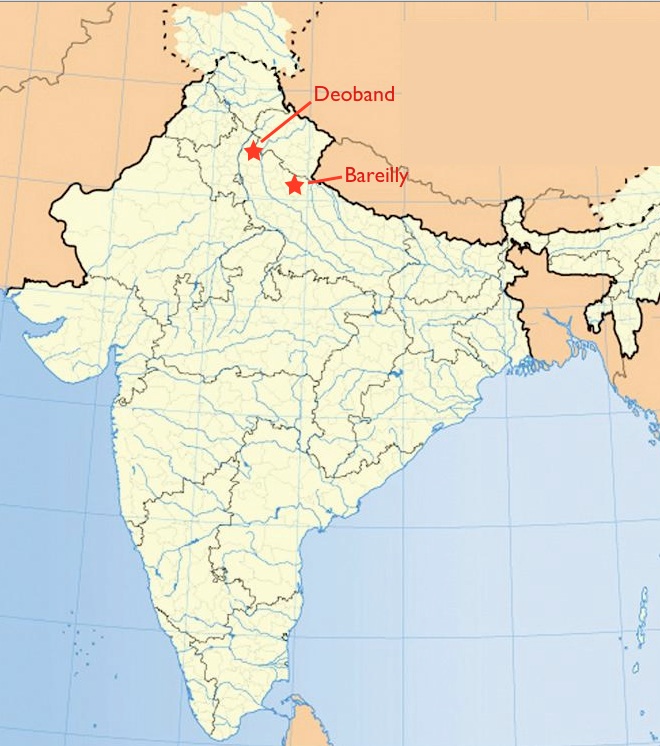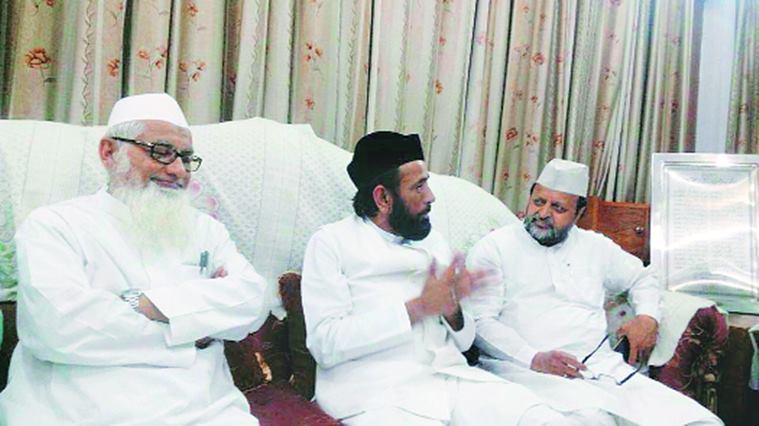A Biased View of Barelvi
Wiki Article
A Biased View of Barelvi
Table of ContentsBarelvi Fundamentals Explained6 Easy Facts About Barelvi ExplainedThe smart Trick of Barelvi That Nobody is Talking AboutLittle Known Facts About Barelvi.
Radical Islamist groups in South Asia such as the Taliban are commonly identified as Wahhabis, coming from the ascetic, puritanical type of Islam institutionalised in Saudi Arabia. But while the connections in between the Wahhabis and also the Taliban are tight, the last really belong to a various branch of the confidence.Sunni Islam is divided into 4 orthodox institutions of law (Madhhabs), each of which is adhered to in unique parts of the Muslim globe. A number of rites and also petition kinds also differ amongst the institutions. As the map above shows, Wahhabism, based in Saudi Arabia, is related to Hanbali regulation, the most strict kind of Islamic jurisprudence.

" Sunni Muslims," Haqqani composes, have actually cast apart their hostility to Wahhabi teams, creating a a great deal of conventional Sunnis who welcome Wahhabi political and jihadi suggestions without always offering up their ceremonies as well as rituals." As is frequently kept in mind, Saudi Arabian religious financing has actually helped damage down the barriers between the 2 sects.
Barelvi - The Facts
Mapping the 4 conventional colleges of Sunni Islamic law is relatively very easy, although the authors of the Wikipdia map published over are worthy of recommendation for doing an especially good job. Yet the differences that really matter are not those of Madhhab, yet rather are discovered amongst much less formal and also far more current "movements" within Islamic idea as well as practice.The Deobandi movement is aligned with Wahhabism and developments a similarly severe, puritanical analysis of Islam. The Barelvi movement, in comparison, protects a more traditional South Eastern version of the faith focused on the techniques of Sufi necromancy. In India and also especially Pakistan, tensions between both teams can be intense, occasionally verging on open warfare.
As recently reported in the, "When the Taliban took over Buner in April 2009, they first besieged Pir Baba's shrine. Taliban leader Fateh Khan said it was because the location was a hub of 'infidelity as well as idolatry.'" As a result, many Sufi shrines are now greatly secured by Pakistani safety forces.
One can, however, conveniently show their place of origin, as both movements are named for communities in northern India: Deoband and also Bareilli. Extreme Deobandi groups are most very closely linked with Pakistan as well as Afghanistan, the motion's intellectual as well as spiritual heart is still the Indian city of Deoband. Its Darul Uloom Deoband is considered to be the 2nd biggest madrasah (spiritual school) in the Sunni Muslim globe, adhering to only Al-Ahzar in Cairo.
More About Barelvi
Solid numbers are difficult to discover, most professionals preserve that Barelvis significantly out-number Deobandis not simply amongst Indian Muslims yet in Pakistan. In Pakistan, nonetheless, Deobandis have actually been advancing of late, and also Barelvis retreating. According to one quote, "some 15 per cent of Pakistan's Sunni Muslims would consider themselves Deobandi, and also some 60 percent remain in the Barelvi custom.Early Deobandi leaders were distressed by the victory of British colonialism and also English-language education, which they looked for to battle by cleansing their religion, stripping away wikipedia reference mystical methods as well as other advancements that they saw as contrary to the confidence (Barelvi). One of the most hardline Deobandis pertained to concern Barelvis, as well as Shiites, as non-Muslim challengers deserving of assault.
Deobandi thinking is also conventional to be nationalistic, concerning the community of the faithful, not the modern-day nation-state, as the correct Quranic political automobile. The majority of Deobandi scholars denied the dividing of British India in 1947, liking to seek the spread of Islam in an undivided India. The idea of Pakistan, furthermore, was originally accepted by Muslim teams disliked by the hardline Deobandis (Barelvi).
Over time, nonetheless, orthodox Sunni Islam concerned control Pakistan. Head Of State Muhammad Zia-ul-Haq (1978-1988) strove to transform Pakistan into a fundamentalist Sunni state, formally stating the heterodox Ahmadis to be non-Muslims. Consequently, the Pakistani federal government progressively veered in the instructions of the extreme Deobandi motion. The connection, however, is a two-edged sword for modern Pakistan, as the Deobandi faithful eventually have ridicule for national identities and also borders.
Barelvi - The Facts
Movie critics connect it to terrorist companies; the Taliban, after see this website all, got up of Deobandi madrasahs in northeastern Pakistan, as did numerous other violence-prone organizations. Shocking fatwas (religious judgments) do not assist its credibility. In May 2010, a decree that women can not benefit earnings stunned mainstream Muslim point of view worldwide. (The referred to it as a "Talibanesque fatwa that reeked of tribal patriarchy.") Also much more humiliating was the 2006 "fatwas for money" bribery detraction, which was exposed by an Indian tv sting operation.

As Abedin composes: On the concern of so-called Wahabism I place it to Madrassi that lots see this site of movie critics of the Deoband seminary case that Deobandi beliefs are just a little step far from major Wahabism. In feedback the replacement Vice Chancellor makes a clear demarcation in between the two institutions of thought, before including that if we think about the Wahabis and the Barelvis as 2 extremes, the Deobandis occupy the centre ground in that continuum.
Report this wiki page